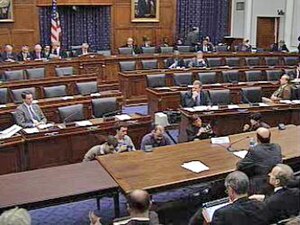| Ben Bernanke (lower-right), Chairman of the Federal Reserve Board of Governors, at a House Financial Services Committee hearing on February 10, 2009. (Photo credit: Wikipedia) |
Conventional wisdom at the moment suggests that victory for the Republican contender Mitt Romney should be more dollar positive as he is more likely to pursue tighter monetary and fiscal policies and avoid the fiscal cliff that could dog the economy in January. But this could be wrong.
Certainly, with Mr. Romney in the White House there would be a lot more to keep the financial markets guessing. On the fiscal side, there are hopes that a Republican-led House of Representatives would make it easier to renegotiate the tax rises and public-spending cuts that threaten growth early next year. On the monetary side, the current ultra-easy policies being pursued by the U.S. Federal Reserve could be abandoned if Mr. Romney seeks to replace its dovish chairman Ben Bernanke with someone more hawkish before Mr. Bernanke's term runs out in January 2014.
But perhaps it is Mr. Romney's pledge to name China as a "currency manipulator" on his first day in office that could prove the real dollar driver. By confronting what will be a new and untested regime in Beijing, a new Republican president could well trigger a more dramatic reaction than financial markets have seen from China in the past. On the one hand, this could be the start of a new global "currency war" as individual countries seek to make their currencies more competitive in a deteriorating global environment.
This could be dollar positive because of the global uncertainty it would create. Or, on the other hand, Beijing could decide to start pulling out of U.S. Treasurys. That could trigger a more serious reconsideration of U.S. asset markets, at the expense of the U.S. currency given that a serious withdrawal by China could send U.S. Treasury prices crashing.
China aside, however, the combination of greater economic uncertainty along with a likely rise in U.S. yields could both play into the dollar's hands and help its index extend the gains it has been making over the last few months. If Mr. Romney loses and President Obama wins, financial markets should see this as resumption of the status quo, at least on the monetary side. However, fiscal adjustment, including successful negotiations to avoid the fiscal cliff, would then depend on whether Mr. Obama's Democrats were to increase the number of seats they hold in the House.
If they fail to do this and the Republicans get even more than the 240 seats out of a total of 430 that they already hold, they could make negotiations on the fiscal cliff even more difficult. And that is when the dollar could really take off. Rather than selling the U.S. currency because of the economic risks that a fiscal cliff pose, investors would more than likely buy the dollar as the outlook for the global recovery takes another downward jolt.
As worries about the global economy increase, the safe-haven mantle that has been keeping the dollar well supported since the middle of September will make it even more attractive. (This is an opinion column by Nicholas Hastings, who is a Senior Correspondent in London for Dow Jones Newswires and has written about foreign exchange for more than 20 years. He previously covered a variety of markets, including equities, fixed income, commodities and energy. He can be contacted on , by email at nick.hastings@dowjones.com or on Twitter @NickHastingsDJ) ...


No comments:
Post a Comment